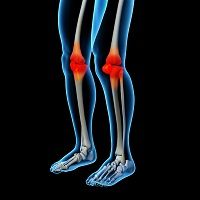Article
What a Clinical Research Review Tells Us-and What It Doesn't-About Knee Osteoarthritis Progression
Author(s):
Spend any appreciable time on PubMed, Medline, or Embase, and you can begin to think that there aren't many untapped areas of clinical exploration. Nothing could be further from the truth, of course, and a recent clinical review in Arthritis Research and Therapy outlines some of the uncharted territory even in a condition as prevalent as osteoarthritis of the knee.

Spend any appreciable time on PubMed, Medline, or Embase, and you can begin to think that there aren’t many untapped areas of clinical exploration. Nothing could be further from the truth, of course, and a recent clinical review in Arthritis Research and Therapy outlines some of the uncharted territory even in a condition as prevalent as osteoarthritis (OA) of the knee.
The study authors performed a systematic review of prognostic factors for the progression of symptomaticknee OA, defined as increase in pain, decline in physical function, or total joint replacement. One of the study’s less surprising findings is that there is strong evidence that a number of factors are closely associated with knee OA progression, including: age, ethnicity, body mass index, comorbidity count, magnetic resonance imaging (MRI) detected infrapatellar synovitis, joint effusion and baseline OA severity, both radiographic and clinical.
One of their more surprising findings? There simply isn’t much available research on prognostic factors for knee OA, and there are even fewer studies into the pain progression of the condition and how exactly the factors listed in the previous paragraph work together to contribute to OA progression. Osteoarthritis is not some rare disease—it is one of the most common chronic diseases and is one of the leadingcauses of pain and disability worldwide. When their review did identify applicable studies, the authors note, “A large variety in definitions of clinical knee OA (progression) remains, which makes it impossible to summarize the evidence through meta-analyses.”
Among the more interesting findings in the clinical review seems to directly contradict one of the more common tenets of medical treatment and disease progression—that, as we age, disease progresses more rapidly. The study authors found that in the case of their review in knee OA, a lower baseline age is associated with an increased risk of symptom progression, where a higher baseline age results in an increased risk for undergoing knee joint surgery due to knee OA. “This inverse association is not properly understood yet and should be explored in future studies,” the authors note.
Limitations of the clinical review include the fact that unlike randomized trials, observational studies of pre-existing disease are subject to biases that may account for discrepancies found between risk factors for incidence and progression. The hypothesis is that risk factors may exist for progressive knee OA, but that flaws in study design and the measure of disease progression may prevent true detection of risk factors. Also, some outcome measures were only assessed once at follow-up, which consequently could have led to an incorrect assessment of true clinical OA progression.The review authors stressed the need for more research on prognostic factors for knee OA using symptom progression as an outcome measure.


